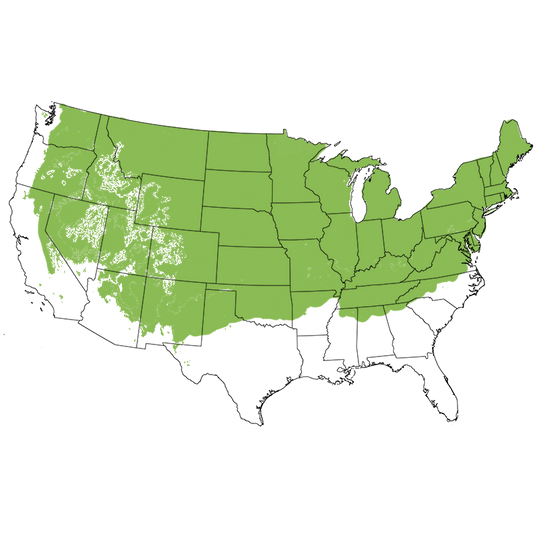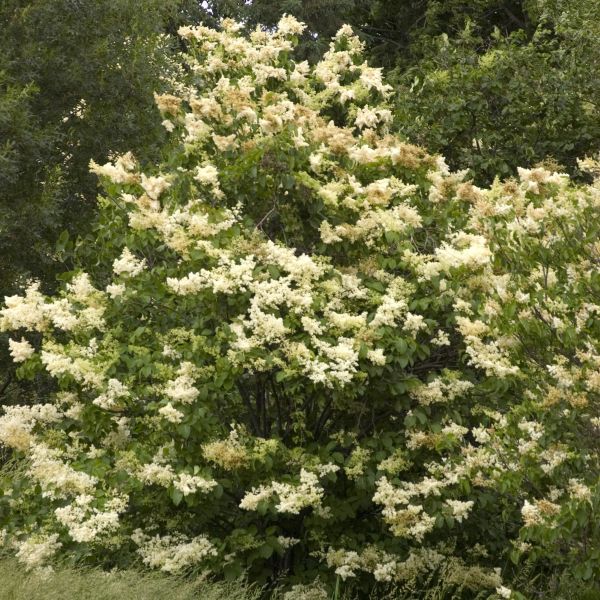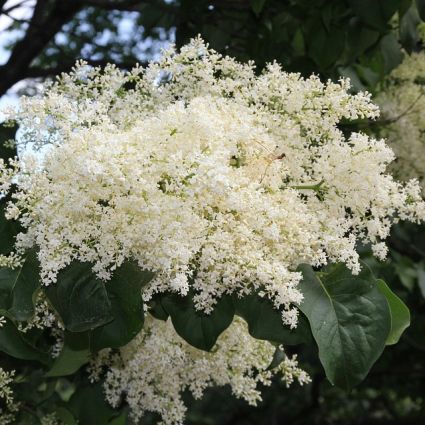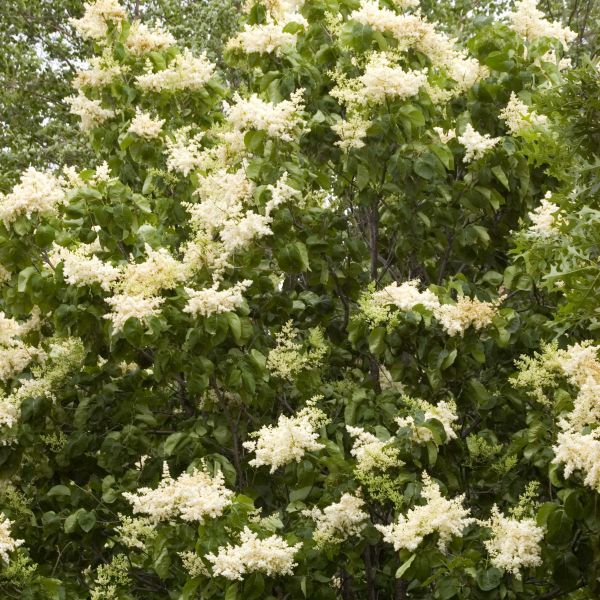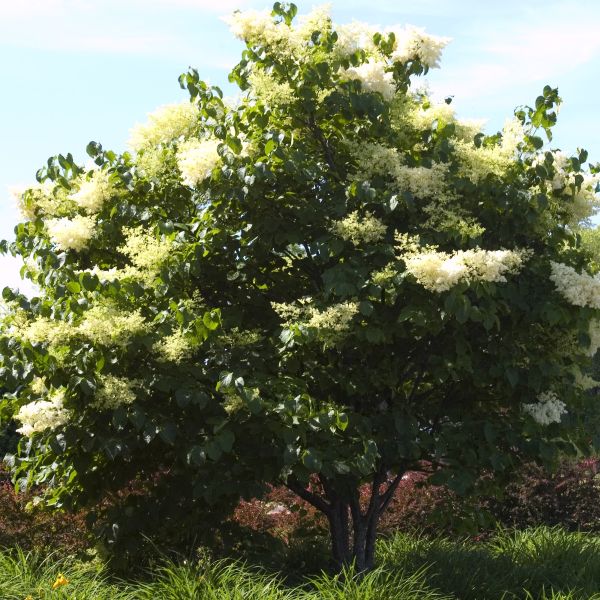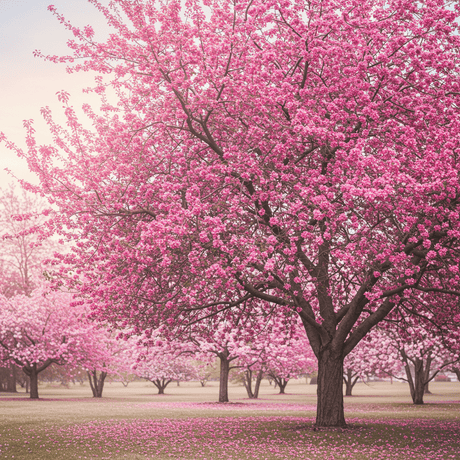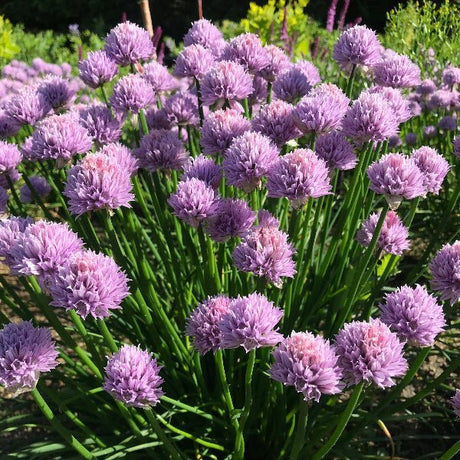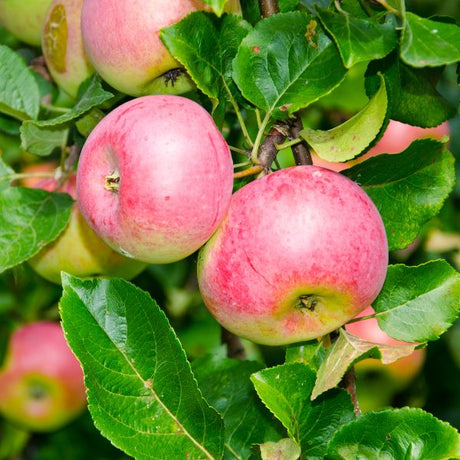Japanese Lilac Tree
Syringa reticulata
Plant Sentry™
Plant Sentry™

Plant Sentry™ Protected
Your order is protected by our compliance system that:
- Prevents restricted plants from shipping to your state
- Ensures plants meet your state's agricultural requirements
- Protects gardens from invasive pests and diseases
Delivery and Shipping
Delivery and Shipping
Delivery and Shipping
Fast, Safe Plant Delivery
Ships in 3-4 business days • Tracking provided • Weather protected
| Under $50 | $9.99 |
| $50 - $99.99 | $14.99 |
| $100 - $149.99 | $16.99 |
| $150 - $198.99 | $24.99 |
| $199+ | FREE |
✓ Zone-specific timing • ✓ Professional packaging • ✓ Health guarantee
Understanding Plant Options
Nature Hills offers plants in two main formats:
- Container Plants: Grown in pots with soil, sized by container volume and plant age
- Bare Root Plants: Dormant plants without soil, sized by height measurements
Container Plant Sizes
Container sizes indicate plant age and growing capacity rather than liquid volume equivalents. Our containers follow industry-standard nursery "trade gallon" specifications, which differ from standard liquid gallon measurements.
Young Plants (6 months to 18 months old)
| Container Size | Actual Volume | Metric Equivalent |
|---|---|---|
| 2" x 2" x 3" | 0.18 - 0.21 dry quarts | 0.20 - 0.23 dry liters |
| 4" Container | 0.31 - 0.87 dry quarts | 0.35 - 0.96 dry liters |
| 4.5" Container | 0.65 dry quarts | 0.72 dry liters |
| 6" Container | 1.4 dry quarts | 1.59 dry liters |
| 1 Quart | 1 dry quart | 1.1 dry liters |
| 5.5" Container | 1.89 dry quarts | 2.08 dry liters |
Established Plants (18 months to 2.5 years old)
| Container Size | Actual Volume | Metric Equivalent |
|---|---|---|
| 2 Quart | 2 dry quarts | 2.2 dry liters |
| #1 Container | 2.26 - 3.73 dry quarts | 2.49 - 4.11 dry liters |
| 5" x 5" x 12" | 3.5 - 4.3 dry quarts | 3.85 - 4.74 dry liters |
Mature Plants (2-4 years old)
| Container Size | Actual Volume | Metric Equivalent |
|---|---|---|
| #2 Container | 1.19 - 1.76 dry gallons | 5.24 - 7.75 dry liters |
| #3 Container | 2.15 - 2.76 dry gallons | 8.14 - 12.16 dry liters |
Large Plants (3-5 years old)
| Container Size | Actual Volume | Metric Equivalent |
|---|---|---|
| #5 Container | 2.92 - 4.62 dry gallons | 12.86 - 20.35 dry liters |
| #6 Container | 5.25 - 6.01 dry gallons | 23.12 - 26.42 dry liters |
| #7 Container | 5.98 - 6.53 dry gallons | 26.34 - 28.76 dry liters |
Bare Root Plants
Bare root plants are sold by height from the root system to the top of the plant. Plants may exceed minimum height requirements.
Common Sizes:
- Trees: 1 foot, 2 feet, 3 feet, 4 feet, 5 feet, 6 feet
- Shrubs & Perennials: 1 foot, 18 inches, 2 feet
Important Notes
Container Volume Specifications
- Trade Gallon Standard: Our containers follow industry-standard "trade gallon" specifications established by the American National Standards Institute (ANSI Z60.1) for nursery stock
- Volume Variations: Actual soil volume may vary due to plant root systems and growing medium settlement
- Age Indicators: Container size primarily indicates plant age and maturity rather than liquid volume equivalents
Growing Conditions
- Plant size can vary based on variety and growing conditions
- Container size helps indicate plant maturity and establishment level
- Larger containers generally mean more established root systems and faster landscape establishment
Seasonal Availability
- Bare root plants are available seasonally when dormant
- Container plants are available throughout the growing season
- Specific varieties may have limited availability in certain sizes
Questions?
For questions about specific plant sizes or availability, please contact our plant experts who can help you choose the right size for your landscape needs.

Plant Sentry™ Protected
Your order is protected by our compliance system that:
- Prevents restricted plants from shipping to your state
- Ensures plants meet your state's agricultural requirements
- Protects gardens from invasive pests and diseases
Plant Profile & Growing Essentials
Cold hardy, Flowering, Fragrant, and Attracts pollinators
Specifications
Specifications
-
Botanical Name
-
Height
-
Width
-
Growing Zones
-
Sunlight
-
Growth RateModerate
-
Flower Color
-
Leaf Color
-
Pollinator FriendlyYes
-
Pollinator Required
-
Bloom PeriodLate Spring, Early Summer, Late Summer
Planting & Care
Planting & Care
Wise landscape designers plan for bloom throughout the whole growing season. The best thing about Japanese Lilac Trees (Syringa reticulata) is they start blooming at a time when all of the spring-flowering shrubs and trees are done blooming. This is the last Japanese or Shrub Lilac to bloom, and it's a must-have in your landscape.
This hardy tree explodes into massive blooms in very late spring or early summer. It does a magnificent job bridging the gap between the hustle and bustle of early spring blooms and the start of the colorful summer flower show. It doesn't just bring flower power, either.
You'll welcome the sweet floral perfume for your garden, too. Green buds cover the branch tips across the tree and look like beautiful Limelight Hydrangea blooms. They'll eventually open to huge, creamy white flowers that are borne on clusters up to a foot long. They have a sweet, Lilac fragrance. You'll see butterflies and buzzing bees stop by for a visit as they check out these nectar resources!
Designers like small trees that work in several seasons. With its dark green leaves, the Japanese Lilac Tree delivers nice shade through the summer. In winter, the textured, reddish-brown bark is a show in its own right. Japanese Lilac Trees are large, robust, and are the latest blooming variety of the Lilac family. Those in warmer climates without cool summers are so jealous of this plant.
It's reliable, easy-care, and urban tolerant. Unlike so many of the spring bloomers, the flowers and leaves are on the tree at the same time. This gives a beautiful and exotic look to your garden. Add this big, beautiful, bountiful and fragrant Lilac variety to your yard. You'll love the way it bursts into action in early summer.
Planting and Application:
Designers use these trees in commercial landscapes and streetscapes in USDA growing zones 3-7. Just consider the Japanese Lilac Tree a fabulous backdrop to graduation parties, early summer weddings and receptions, Memorial Day get-togethers, and first-of-the-season barbecues!
As you might have guessed, landscape designers prefer plants that are versatile. This is another area where the Japanese Lilac Tree really delivers. It can be used as either a multi-trunk tree or allowed to grow into a large shrub. Lower branches can be trimmed up to show off the lovely main trunks. Doing so creates a beautiful, tree-form focal point. Japanese Lilac Trees make fantastic specimen plants for a patio, courtyard, or high-profile area.
It's wonderful when placed near a seating area where you can see and smell the flowers up close. However, it also is incredibly showy when seen at a distance. Use one as an anchor in a foundation planting at the corner of your house or a commercial building. They can be added to mixed borders and windbreaks as an eye-catching, fragrant tree that improves the view from your house.
These super hardy plants are prized for use in urban landscapes. They work beautifully as street trees, or along sidewalks and patios. Urban planners include them in median strips and roadways because they are tolerant of road salt. They can even be used under utility wires.
Or, you can choose to leave the lower branches on to develop a large shrub. Use multiple plants along your driveway or running the length of the back of your property. You'll easily extend the height of hard landscaped fencing in order to screen neighbors and boost privacy. They'll create a lovely backdrop to your mixed borders as an informal hedge.
To create a privacy screen, plant a hedge 4-6 feet apart. You'll measure from trunk to trunk. This is known as planting "on center". For the fastest solid screen, buy the largest container size we have in stock, and plant 4 feet apart.
- Massive Flower Display of Creamy White, Fragrant Flowers
- Showy, Reddish-Brown Bark Delivers Winter Interest
- Blooms When Other Flowering Plants Are Not in Bloom
- Tropical Looking Green Foliage
- Designer Favorite Hedge, Accent, Patio Tree & Specimen
#ProPlantTips for Care:
For the best floral display, plant the Japanese Lilac Tree in well-drained soil where it will get plenty of sun. Too much shade can eliminate flowering, so please plant in full sun for the best bloom. The soil must be well-drained. It will grow in clay soils if they drain quickly after rain.
Give the tree moderate, regular moisture - especially during the flower production time. If there is a suspected issue with drainage, add more dirt in a mound 18 - 24 inches above your native soil line. You'll plant directly in that mound.
After the roots are established in your soil, the trees can tolerate occasional dry conditions. However, you'll need to provide supplemental water during extended periods of drought to keep your plants stress-free. Mulch around lawn trees to avoid this.
For the best flowering, size up to the largest container size we have. Lilacs will not make flowers until they have 3-year-old wood, so please have a little patience if you buy one of our younger plants.
If you live with deer in your area, apply repellent spray on planting day. Deer are hungry and curious, and you want to train them to leave your plants alone. Reapply according to the label.
As with all Lilacs, pruning is best done right after the flowers are done blooming. If you are pruning at other times of the year, you will be removing the flower buds for the next season. Keep high-nitrogen lawn fertilizers away from your tree, as they can eliminate flower bud production. This is especially true if the plants are in or near lawn areas.
- Full Sun
- Moderate Consistent Moisture & Appreciates Mulched Beds
- Most Well-Drained Soil Types
- Prune After Flowering - Multi-Trunk Small Tree or Large Shrub
- Easy Care - Tolerant of Urban Conditions & Road Salt
Don't miss your chance to showcase this incredible flower display in your landscape. The sooner you buy from Nature Hills, the sooner you can enjoy! You'll easily fall in love with fragrant Japanese Lilac Trees, just like garden designers across the country! Order today.
Frequently Asked Questions
How big do Japanese Lilac Trees get?
The Japanese Lilac Tree can reach a mature height of 20 - 25 feet tall, and a width of 15 - 25 feet in optimal conditions.
Are Japanese Lilac Trees any good?
The Japanese Lilac Tree is a fantastic fragrant tree that blooms later in the spring to early summer when little else is blooming. Easy-care, salt and urban condition tolerant, plus very cold hardy!
How do you take care of a Japanese Lilac Tree?
Provide your Lilac Tree with full sun and well-drained enriched soil that has a good layer of mulch over the soil surface. Water moderately yet consistently and fertilize with a blooming plant fertilizer at least once a year. Prune only immediately after the first flowers have faded.
Are Japanese Lilac Trees fragrant?
Japanese Lilac Trees carry the same delightful Lilac scent as the rest of the family.
What Shipping Options Do You Offer?
NatureHills.com works closely with our growers and nursery professionals to ensure we ship when it is most appropriate for your area. Our goal is to deliver the hardiest plants by avoiding extreme high and low temperatures. Check out our shipping schedule for more information and to learn our wills and won'ts when it comes to shipping plants. Find your Japanese Lilac Tree for sale here at NatureHills.com!
